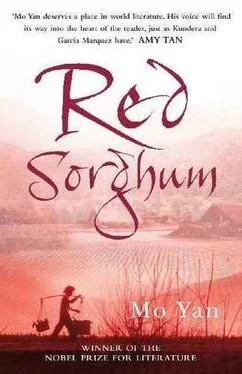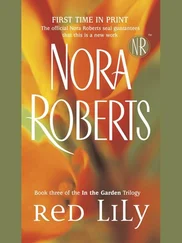As the man knelt in the enclosure opening, he raised his arms slowly and deliberately. Uncle Arhat’s eyes were riveted on his back and his head, around which hung an aura of mystery. The man took a deep breath, cocked his head, and thrust out his hands, like arrows from a bow, to grab two metal rods. A green glare shot from his eyes, and seemed to crackle when it struck an object. The metal rods silently parted, admitting more light into the enclosure from the lanterns and overhead stars, and revealing the shoe of a sentry. Uncle Arhat saw a dark shadow dart out of the enclosure. The Jap sentry grunted, then, in the man’s vicelike grip, crumpled to the ground. The man picked up the Jap’s rifle and slipped silently into the darkness.
It took Uncle Arhat a moment to realise what had happened. The middle-aged man had shown him the way to escape! Cautiously, he crawled out through the opening. The dead Jap lay on the ground, face up, one leg still twitching.
After crawling into the sorghum field, Uncle Arhat straightened up and followed the furrows, taking care not to bump the stalks and get them rustling. He found his way to the bank of the Black Water River, where the three stars — Rigel, Betelgeuse, and Bellatrix — hung directly overhead. A heavy predawn darkness had fallen around him. Stars glistened in the water. As he stood briefly on the riverbank, he shivered from the cold, his teeth chattered, and the ache in his chin spread to his cheeks and ears, finally merging with the throbbing pain in his festering scalp. The crisp air of freedom, filtered through the juices of the sorghum plants, entered his nostrils, his lungs, and his intestines. The ghostly light of the two lanterns shone weakly through the mist; the dark outline of the fir-stake enclosure was like an immense graveyard. Astonished at having got away so easily, he strode onto the rickety wooden bridge, above splashing fish and rippling water, as a shooting star split the heavens. It was as though nothing had happened. He was free to return to his village to let his wounds mend and to go on living. But as he was crossing the bridge, he heard the plaintive braying of a mule on the southern bank. He turned back for Grandma’s mules. This decision would lead to a grand tragedy.
Horses and mules had been tied to a dozen or more tethering posts not far from the enclosure, in an area saturated with their foul-smelling urine. The horses were snorting and eating sorghum stalks; the mules were gnawing on the tethering posts and shitting loose stool. Uncle Arhat, stumbling three times for every step, stole in among them, where he smelled the welcome odour of our two big black mules and spotted their familiar shapes. Time to free his comrades in suffering. But the mules, strangers to the world of reason, greeted him with flying hooves.
‘Black mules,’ Uncle Arhat mumbled, ‘black mules, we can run away together!’ The irate mules pawed the earth to protect their territory from their master, who was unaware that the smell of his dried blood and new wounds had changed his identity to them. Confused and upset, he stepped forward, and was knocked down by a flying hoof. As he lay on the ground, his side started turning numb. The mule was still bucking and kicking, its steel-crescent shoes glinting like little moons. Uncle Arhat’s hip swelled up painfully. He clambered to his feet, but fell back. As soon as he hit the ground, he struggled back up. A thin-voiced rooster in the village crowed once more, as the darkness began to give way to a glimmer of stars that illuminated the mules’ rumps and eyeballs.
‘Damned beasts!’
With anger rising in his heart, he stumbled around the area looking for a weapon. At the construction site of an irrigation ditch he found a sharp metal hoe. Now armed, he walked and cursed loudly, forgetting all about the men and their dog no more than a hundred paces distant. He felt free — fear is all that stands in the way of freedom.
A red solar halo crumbled as the sun rose in the east, and in the predawn light the sorghum was so still it seemed ready to burst. Uncle Arhat walked up to the mules, the rosy colour of dawn in his eyes and bitter loathing in his heart. The mules stood calmly, motionlessly. Uncle Arhat raised his hoe, took aim on the hind leg of one of them, and swung with all his might. A cold shadow fell on the leg. The mule swayed sideways a couple of times, then straightened up, as a brutish, violent, stupefying, wrathful bray erupted from its head. The wounded animal then arched its rump, sending a shower of hot blood splashing down on Uncle Arhat’s face. Seeing an opening, he swung at the other hind leg. A sigh escaped from the black mule as its rump settled earthwards and it sat down hard, propped up by its forlegs, its neck jerked taut by the tether; it bleated to the blue-grey heavens through its gaping mouth. The hoe, pinned beneath its rump, jerked Uncle Arhat into a squatting position. Mustering all his strength, he managed to pull it free.
The second mule stood stupidly, eyeing its fallen comrade and braying piteously, as though pleading for its life. When Uncle Arhat approached, dragging his hoe behind him, the mule backed up until the tether seemed about to part and the post began to make cracking sounds. Dark-blue rays of light flowed from its fist-sized eyeballs.
‘Scared? You damned beast! Where’s your arrogance now? You evil, ungrateful, parasitic bastard! You ass-kissing, treacherous son of a bitch!’
As he spat out wrathful obscenities, he raised his hoe and swung at the animal’s long, rectangular face. It missed, striking the tethering post. By twisting the handle up and down, back and forth, he finally managed to free the head from the wood. The mule struggled so violently that its rear legs arched like bows, its scrawny tail was noisily sweeping the ground. Uncle Arhat took careful aim at the animal’s face — crack — the hoe landed smack on its broad forehead, emitting a resounding clang as metal struck bone, the reverberation passing through the wooden handle and stinging Uncle Arhat’s arms. Not a sound emerged from the black mule’s closed mouth. Its legs and hooves jerked and twitched furiously before it crashed to the ground like a capsized wall, snapping the tether in two, with one end hanging limply from the post and the other coiled beside the dead animal’s head. Uncle Arhat watched quietly, his arms at his sides. The shiny wooden handle buried in the mule’s head pointed to heaven at a jaunty angle.
A barking dog, human shouts, dawn. The curved outline of a blood-red sun rose above the sorghum field to the east, its rays shining down on the black hole of Uncle Arhat’s open mouth.
THE TROOPS EMERGED onto the riverbank in a column, with the red sun, which had just broken through the mist, shining down on them. Like everyone else’s, half of my father’s face was red, the other half green; and, like everyone else, he was watching the mist break up over the Black Water River. A fourteen-arch stone bridge connected the southern and northern sections of the highway. The original wooden bridge remained in place to the west, although three or four spans had fallen into the river, leaving only the brown posts, which obstructed the flow of the white foam on top of the water. The reds and greens of the river poking through the dissipating mist were horrifyingly sombre. From the dike, the view to the south was of an endless panorama of sorghum, level and smooth and still, a sea of deeply red, ripe faces. A collective body, united in a single magnanimous thought. Father was too young then to describe the sight in such flowery terms — that’s my doing.
Sorghum and men waited for time’s flower to bear fruit.
The highway stretched southward, a narrowing ribbon of road that was ultimately swallowed up by fields of sorghum. At its farthest point, where sorghum merged with the pale vault of heaven, the sunrise presented a bleak and solemn, yet stirring sight.
Читать дальше












